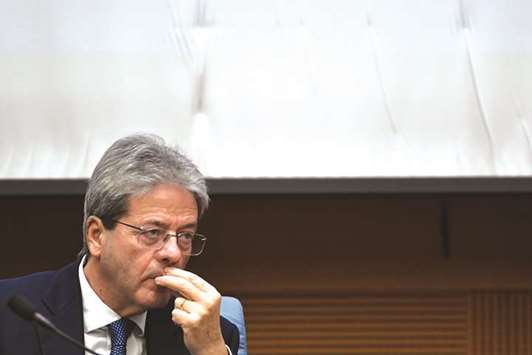Italian Prime Minister Paolo Gentiloni lamented yesterday his government’s failure to pass a new law on citizenship for the children of immigrants as a flaw on its record ahead of elections due early next year.
The question of whether some 800,000 minors who were born in Italy to foreign parents, or who arrived at a young age, could be declared citizens under certain conditions, became the most divisive pre-election issue, prompting a scuffle in parliament and exposing deep fissures in the ruling Democratic Party (PD).
“The truth is we didn’t manage to put together sufficient numbers (in parliament) to approve the law,” Gentiloni told a news conference. “Not managing to do this is a flaw on the government’s record.”
Not enough senators attended the final sitting of the upper house to vote on the proposal, which would have allowed children born in Italy to non-Italians who have long-term residency permits, or who arrive before their 12th birthdays and spend at least five years in formal education, to obtain a passport.
Mass migration into Europe over the past four years has hardened voters across the continent against new arrivals.
In Italy, that sentiment helped block the law though Gentiloni was at pains to point out the new rules would not have applied to hundreds of thousands of migrants, mainly Africans, who have arrived by boat in southern Italy in the last few years.
According to pollster Renato Mannheimer, support among Italians for the law fell to 50% in October, compared with some 70% a year earlier.
A gauge by Termometro Politico showed 63% opposing it.
Right-wing parties called it a threat to national culture and security, and senators clashed in the upper house of parliament when the bill was discussed in June.
The Northern League, which in coalition with former premier Silvio Berlusconi’s Forza Italia party looks set to win the most votes at next year’s election, took to the streets in protest.
Giorgia Meloni, whose Brothers of Italy party will likely join the coalition, warned of “ethnic substitution”.
The anti-establishment 5-Star Movement (M5S) and Forza Italia said citizenship for immigrants was not a priority for the Italian government and accused the PD of using it as a propaganda tool.
Within the ruling party, it also became a bone of contention when its leader and former prime minister Matteo Renzi appeared to lose enthusiasm as opinion polls reflected dwindling support.
Rules on citizenship vary across the European Union, and no country in the bloc follows a pure so-called “right of the soil” principle, whereby anyone born in the country is automatically considered a citizen, as is the case in the United States.
Currently, anyone born in Italy to foreign parents can apply for citizenship when they reach 18, but must prove they have lived there without interruption their entire life, a requirement that rights groups say is too stringent.
PD Senator Luigi Manconi, who campaigned for the law, said the government had not done enough, and the expected make-up of the next parliament would probably impede any similar measures.
“The necessity that was at the root of this proposed law sadly remains unsatisfied,” Manconi said.
Gentiloni: The truth is we didn’t manage to put together sufficient numbers (in parliament) to approve the law. Not managing to do this is a flaw on the government’s record.

Gentiloni mourns failure to pass new citizenship law
